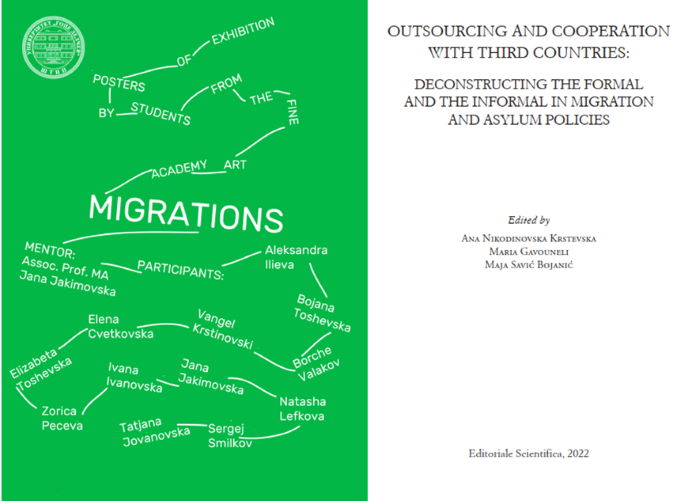
Автори/Уредници:
Ana Nikodinovska Krstevska, Maria Gavouneli and Maja Savić Bojanić
Издавач:
Editoriale Scientifica – Napoli
Година: 2022
ISBN 979-12-5976-374-7
Краток приказ:
This book is the second publication delivered within the Jean Monnet Network on Migration and Asylum Policies Systems SYSTEMS (MAPS), born within the context of the past experiences of Jean Monnet activities carried out in the University of Naples “L’Orientale”, and involving, as partners universities of other nine different European countries: National and Kapodistrian University of Athens; University of A Coruña; University Jean Moulin Lyon 3; University of Malta; University of Innsbruck; Queen Mary University of London; University Goce Delčev-Štip; University Sarajevo School of Science and Technology (SSST); Stiftung Europa-Universität Viadrina Frankfurt (Oder).
The aim of the MAPS project is to highlight key changes and best practices of the different migration and asylum policy systems through the participation of the partner universities in the project. Specifically, the purpose is to explore general principles and safeguards of asylum systems, and at the same time to analyze their weaknesses and compliance with international law obligations to protect asylum seekers, refugees, and migrants in general. Aside from other project activities, the partner universities University Goce Delčev in Štip, Kapodistrian University of Athens and Sarajevo School of Science and Technology organized three conferences during the period 2020-2021. Initially these events were scheduled to be held in 2020, but due to the breakout of COVID-19 pandemics, they were subject to postponement. Within this timeframe, the Sarajevo School of Science and Technology under the direction of prof. Maja Savić Bojanić organized a workshop in February 2020, entitled Migration and Asylum Policies Systems. In July 2020, prof. Maria Gavouneli from the Kapodistrian University of Athens organized a webinar on Outsourcing and cooperation with third countries. And the third conference was organized by the University Goce Delčev – Štip, under direction of prof. Ana Nikodinovska Krstevska and prof. Olga Koševaliska, entitled ‘Outsourcing and cooperation with third countries: Deconstructing the formal and the informal in migration and asylum policies, which took place in hybrid format, both in presence, at the University Goce Delčev in Štip in North Macedonia, and in online modality. As a matter of fact, most of the essays contained in this publication were presented during the conference at the University Goce Delčev in Štip. They discuss subject related to externalization of EU asylum and migration policies towards third countries and their impact upon human rights of migrants and refugees. Specifically, Aleksandar Dimovski, Trainer and FRONTEX Fundamental Rights Specialist from Republic of North Macedonia, and Milica Šutova, Assistant professor in Civil Law at the Faculty of Law, University Goce Delčev in Štip explore border cooperation in North Macedonia and the impact of border management upon human rights. The question that they try to answer within the border management environment and praxis is ‘Are border practices upon migrants and refugees just or unjustifiable?’ Anna Liguori, Associate professor in International Law at the University of Naples ‘Orientale’, explores the case-law of the EU Court of Justice related to the 2016 EU – Turkey Statement, giving a rich overview of the critical aspects concerning human rights and refugee law in relation to the Statement. Olga Koševaliska, Associate professor in Criminal Law at the Faculty of Law, University Goce Delčev in Štip, together with Ana Nikodinovska Krstevska, Associate professor in EU Law and Elena Maksimova, Assistant professor in Criminal Law at the same Faculty of Law, University Goce Delčev in Štip, examine the challenges of illegal migration in North Macedonia and European Union tailored approach to solidarity in confront, exemplifying the level of cooperation between North Macedonia during the refugee crisis until today. Remaining on the Balkan route, Žaneta Poposka, professor in Human Rights at the Faculty of Law, University Goce Delčev in Štip, in her essay elaborates the elements and features of hate crime on grounds of refugee, asylum seeker or migrant status during the Refugee crisis, but also assesses the key challenges in relation to the under-reporting of this type of hate crimes and the weak position of hate crime in national legislation of North Macedonia. Finally, Ester del Nonno, PhD Candidate in International Law at the University Jean Moulin Lyon III, together with Liliana Haquin Saenz, researcher in international law at the Centre de droit international, University Jean Moulin, Lyon III, and Mehtap Akbay Kaygusuz, researcher in international law at the Centre de droit international, University Jean Moulin Lyon III and Dr. at the İstanbul University, in their essay, explored the externalization of asylum in the European Union through the EU – Turkey statement, and furthermore they extended their research exploring also the recent Danish case and their ‘radical’ practices of externalization of the asylum process.
Aside from academic papers, this volume employs an interdisciplinary approach to Migration and Asylum Policies Systems, and it reproduces the academic artwork of the students from the Academy of Fine Arts from the Goce Delčev in Štip, under mentorship of prof. Jana Jakimovska, who for the activities of the project have elaborated posters related to migration and asylum, and human rights issues. Therefore, between the pages of this publication the reader will have the opportunity to enjoy a specimen of art posters elaborated from Aleksandra Ilieva, Bojana Toševska, Jana Jakimoska, Borče Valakov, Vangel Kristinovski, Ivana Ivanovska, Tatjana Jovanovska, Nataša Llefkova, Ankica Stevanovska, Zorica Peceva, Elena Cvetanovska, Elizabeta Toševska and Sergej Smilkov.
At the end we hope that this edited volume will raise interest among the public about the situation of asylum, refugees, and migration in the partner countries and beyond, but most of all we hope that it will serve as an inspiration to students as they represent new generation of actors who can make real changes to views, policies and policy making both in the EU and in the world.

